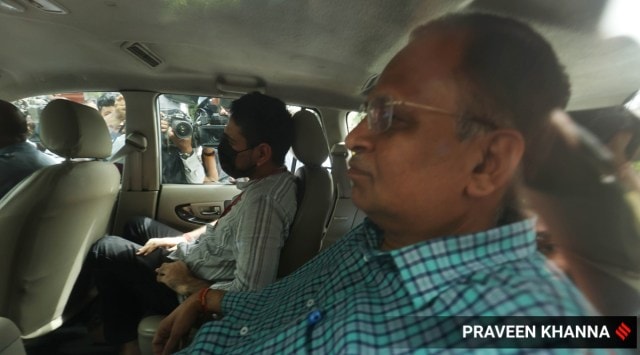Satyendar Jain was in de facto control: ED opposes AAP leader’s bail plea in ‘money laundering’ probe
Appearing for the agency, Additional Solicitor General SV Raju submitted before a single judge bench of Justice Dinesh Kumar Sharma that prior to the check period, Jain had 50% shareholding in the companies.
 The High Court asked the ED to submit a brief note on the role assigned to each of the accused – Satyendar Jain, Ankush Jain and Vaibhav Jain – as well as the allegations against them (Express file photo by Praveen Khanna)
The High Court asked the ED to submit a brief note on the role assigned to each of the accused – Satyendar Jain, Ankush Jain and Vaibhav Jain – as well as the allegations against them (Express file photo by Praveen Khanna) The Enforcement Directorate, probing the 2017 alleged money laundering case involving jailed AAP leader Satyendar Jain, told the Delhi High Court Monday that he was in “de facto control” of the companies involved.
The CBI had filed a case in August 2017 under the Prevention of Corruption Act and, a year later, filed a chargesheet against Jain, his wife, and four of his associates in the disproportionate assets case. Following this case, the ED had provisionally attached immovable properties worth Rs 4.81 crore belonging to Akinchan Developers Pvt Ltd, Indo Metal Impex Pvt Ltd, Paryas Infosolutions Pvt Ltd, Manglayatan Projects Pvt Ltd, and JJ Ideal Estate Pvt Ltd.
It was the ED’s case before the trial court that the companies under investigation were only paper companies that did not earn any income and that Jain was in control. Previously, Jain, in his arguments before the HC, had said that the ED’s case is concerning the check period between February 14, 2015, and May 31, 2017, which is also mentioned in the chargesheet filed in 2018.
Check period is the duration within which the agency sees whether proceeds of crime was generated, based on which they can say money laundering has taken place.
Appearing for the agency, Additional Solicitor General SV Raju submitted before a single judge bench of Justice Dinesh Kumar Sharma that prior to the check period, Jain had 50% shareholding in the companies. “He had shareholding interest, which he gave up in favour of the benamidars and then he says I have done nothing,” the ASG submitted.
The trial court in its November 17, 2022, order had rejected Jain’s bail plea, observing that it “has prima facie come on record that Jain was actually involved in concealing proceeds of crime by giving cash to Kolkata-based entry operators, and bringing the cash into three companies”.
“By this process, the proceeds of crime to the tune of 1/3rd of Rs 4.61 crore has been laundered. Apart from that, Satyendar Kumar Jain has also used the same modus operandi to convert his proceeds of crime of Rs 15,00,000 by receiving accommodation entries from Kolkata-based entry operators… The applicant/accused had knowingly done such activity to obliterate the tracing of the source of ill-gotten money and, accordingly, the proceeds of crime was layered through Kolkata-based entry operators in a way that its source was difficult to decipher,” the court said. Jain moved the HC seeking bail against this order.
Raju said the ED’s case is that shareholding is not the “only yardstick to determine control”. “He was in de facto control of all companies”. On “modus operandi”, ED’s case is that cash was transferred from Delhi to Kolkata through Hawala operators and in lieu of cash, accomodation entries were received from Kolkata-based shell companies, which actually had “no business”.
Referring to a witness statement, Raju argued, “If you are not in control, why would you give cash as accommodation entries unless you are a beneficiary shareholder?”
On a query put to Raju about when does the offence of money laundering take place, he responded that it takes place the moment you have “possession”. “It starts on August 1, 2015. You need not convert it, as Vijay Madanlal (Supreme Court judgment) says.”
Raju read the statement given by JP Mohta, the Chartered Accountant for the companies, which said that he had been appointed as the auditor of the companies by the board on the recommendation of Satyendar Jain. At this point, the High Court asked the ED to submit a brief note on the role assigned to each of the accused – Satyendar Jain, Ankush Jain and Vaibhav Jain – as well as the allegations against them. The matter is next listed on March 21.







